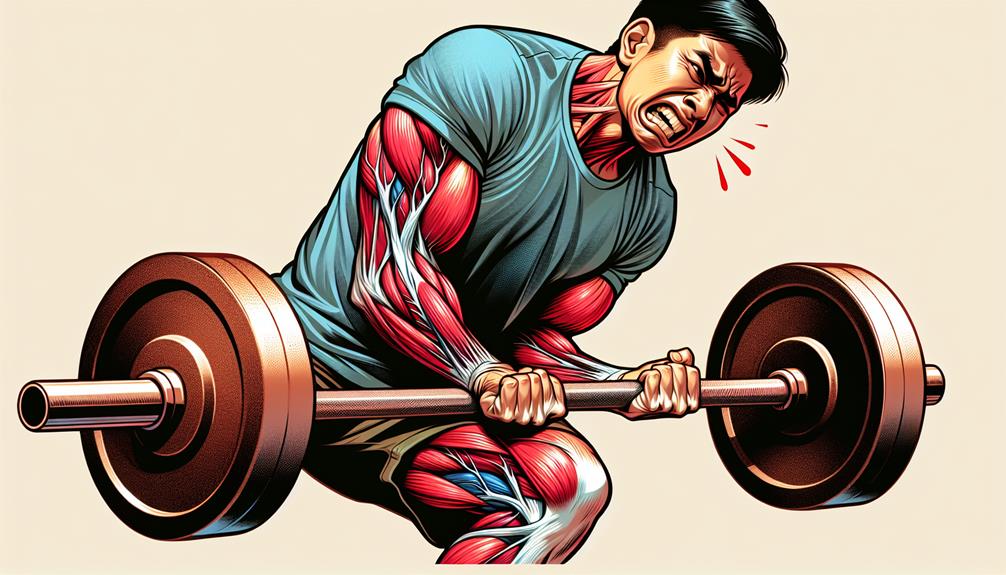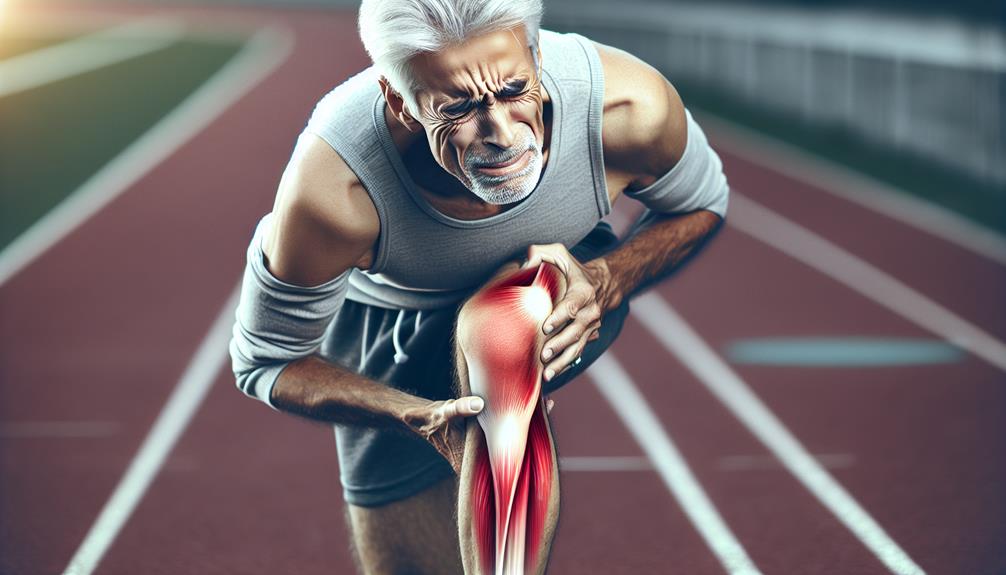When it comes to muscle tears, they're like delicate threads that can easily fray if not cared for properly. Understanding the causes and risk factors behind these injuries is crucial for your physical well-being. From overuse and repetitive motions to age and previous injuries, there are various factors that can contribute to the onset of muscle tears. But what are the specific mechanisms at play, and how can you protect yourself from these debilitating injuries?
Key Takeaways
- Muscle tears commonly result from improper technique, overuse, poor warm-up, and muscle imbalances.
- Hydration, rest, proper form, and stretching play vital roles in preventing muscle tears.
- Age and previous injuries increase muscle tear risk, necessitating tailored rehabilitation and gradual progression strategies.
- Understanding causes like sudden movements, repetitive stress, and inadequate recovery can help mitigate muscle tear risks.
Common Causes of Muscle Tears
What are the primary factors that contribute to muscle tears and how can they be prevented? Muscle tears can result from a variety of factors, with improper technique and sudden movements being key culprits. Improper technique places excessive strain on muscles, increasing the risk of tears. It is crucial to ensure proper form during physical activities to prevent unnecessary stress on the muscles. Additionally, sudden movements, especially when not executed correctly, can lead to muscle tears due to the rapid and unexpected stress placed on the muscle fibers. Hydration also plays a critical role in muscle health, with inadequate hydration potentially leading to muscle cramps and strains. Proper hydration ensures that muscles are functioning optimally and reduces the risk of tears. Lastly, inadequate rest can contribute to muscle tears as the body needs time to recover and repair muscle tissues. Ensuring adequate rest periods between intense physical activities is essential in preventing muscle tears and maintaining overall muscle health.
Overuse and Repetitive Motion
Overuse and repetitive motion can significantly contribute to the development of muscle tears, posing a risk to muscle health and function. When muscles are subjected to repetitive stress without adequate rest, they become more prone to tears and injuries. Here are some key points to consider:
- Proper Rest and Recovery: Ensure you allow your muscles enough time to rest and recover between repetitive activities. This can help prevent overuse injuries and reduce the risk of muscle tears.
- Cross-Training: Engaging in a variety of activities that use different muscle groups can help prevent overuse injuries. By diversifying your workout routine, you can distribute the stress on your muscles more evenly.
- Stretching and Flexibility: Incorporating regular stretching exercises into your routine can help improve flexibility and reduce the risk of muscle tears. Stretching helps to maintain muscle elasticity and range of motion, which are important factors in preventing injuries.
To aid in the prevention of muscle tears due to overuse and repetitive motion, it is essential to implement these preventive measures and recovery techniques into your exercise regimen.
Poor Warm-Up and Stretching Practices

Poor warm-up and stretching practices can increase the likelihood of muscle tears and injuries during physical activity. When you fail to properly warm up your muscles and neglect stretching, they are more prone to strain and tears. To prevent such injuries, it is crucial to follow proper warm-up techniques and stretching routines.
Proper Warm-Up and Stretching Techniques
Implementing the right warm-up and stretching practices can significantly reduce the risk of muscle tears. Here are some key points to keep in mind:
| Proper Technique | Prevention Strategies |
|---|---|
| Gradually increase intensity | Ensure adequate hydration |
| Focus on dynamic movements | Incorporate rest days into your routine |
| Target all major muscle groups | Listen to your body and avoid overexertion |
| Include sport-specific exercises | Maintain a balanced diet rich in nutrients |
Muscle Imbalance and Weakness
Neglecting to address muscle imbalances and weaknesses can significantly heighten the risk of sustaining injuries during physical activity. Imbalances in muscle strength and flexibility can lead to compensations in movement patterns, placing undue stress on certain muscles and joints. To prevent these issues, it is essential to focus on imbalance correction and improving overall muscle strength. Here are some key points to consider:
- Identifying Imbalances: Conduct a thorough assessment to pinpoint areas of weakness and imbalance in your muscle groups.
- Targeted Strength Training: Engage in strength training techniques that specifically target weaker muscle groups to rebalance strength ratios and improve overall stability.
- Functional Exercises: Incorporate functional exercises that mimic movements performed in your sport or daily activities to enhance muscle coordination and balance.
Age and Previous Injuries

Addressing age-related changes and previous injuries requires a tailored approach to mitigate the risk of muscle tears during physical activities. As you age, your muscles tend to lose elasticity and strength, making them more prone to tears when subjected to intense physical exertion. Additionally, previous injuries can lead to scar tissue formation, which alters the muscle structure and increases the likelihood of tears during athletic performance.
To optimize your athletic performance and reduce the risk of muscle tears, it is crucial to incorporate specific rehabilitation strategies into your routine. Rehabilitation strategies such as targeted strengthening exercises, flexibility training, and proper warm-up protocols can help improve muscle function and prevent further injuries. Moreover, focusing on gradual progression in training intensity and duration can allow your muscles to adapt and become more resilient over time.
Frequently Asked Questions
Can Muscle Tears Be Prevented Entirely, or Are They an Inevitable Risk for Anyone Who Engages in Physical Activity?
You can't avoid muscle tears completely, but with proper injury prevention strategies like targeted strength training and post-injury physical therapy, you can minimize the risk. Remember, "an ounce of prevention is worth a pound of cure."
Are There Any Specific Exercises or Stretches That Can Help Prevent Muscle Tears in Certain Muscle Groups?
To prevent muscle tears, focus on targeted stretching routines for specific muscle groups, such as hamstrings and quads. Incorporate strength training to maintain muscle health. By emphasizing injury prevention through proper warm-ups and cool-downs, you can reduce the risk of muscle tears.
How Long Does It Typically Take for a Muscle Tear to Heal, and What Are the Best Ways to Speed up the Recovery Process?
To recover from a muscle tear, focus on the recovery timeline by allowing ample rest. Prevention techniques include proper warm-ups and gradual progression in intensity. Healing methods involve ice, compression, elevation, and rehab exercises tailored to your injury.
Are There Any Dietary Supplements or Specific Nutrients That Can Help Prevent Muscle Tears or Aid in the Healing Process?
For muscle tear prevention and healing, dietary supplements like omega-3 fatty acids, collagen, and vitamin C can be beneficial. Nutrients such as protein, magnesium, and zinc play crucial roles too. Consult a healthcare provider for personalized advice.
Can Muscle Tears Lead to Long-Term Effects or Chronic Pain, Even After They Have Healed?
Yes, muscle tears can lead to long-term effects and chronic pain, even after healing. Scar tissue formation, altered muscle function, and increased risk of re-injury are common consequences. Proper rehabilitation and preventive measures are crucial.
Conclusion
In conclusion, muscle tears can be caused by a variety of factors such as overuse, poor warm-up practices, muscle imbalances, and age. It is important to be mindful of these risk factors and take preventative measures to avoid injury. Remember, a muscle tear can feel like a million tiny explosions going off in your body, so take care of your muscles to keep them strong and healthy.













